 CAIN Web Service
CAIN Web Service
New Year Releases 2006 - Public Records of 1975
[CAIN_Home]
[Key_Events]
Key_Issues]
[Conflict_Background]
BACKGROUND: [Acronyms]
[Glossary]
[NI Society]
[Articles]
[Chronologies]
[People]
[Organisations]
[CAIN_Bibliography]
[Other_Bibliographies]
[Research]
[Photographs]
[Symbols]
[Murals]
[Posters]
[Maps]
[Internet]
PUBLIC RECORDS:
1972
1973
1974
1975
Documents: Public Record Office (PRO) ... Page Compiled: Martin Melaugh
Material is added to this site on a regular basis - information on this page may change
New Year Releases 2006
Public Records of 1975
Northern Ireland
On 1 January 2006 the Public Record Office (PRO) in Kew released a number of government documents under the 'thirty year rule'. Some of these documents were related to events in Northern Ireland during 1975. To coincide with the release of these documents BBC Northern Ireland television broadcast a programme entitled 'Cabinet Confidential: Secrets of 1975' which was shown on the evening of Wednesday 4 January 2006. The producers of the programme also compiled a web page based on the programme which included scans of some of the documents in question. (This web page was made available at the PRO web site {external_link}.)
The following page is based on those documents related to Northern Ireland which were scanned and included at the PRO site. The documents are listed in chronological order. Users can either view the documents at the PRO site or at the CAIN site - 'click' on the page numbers (two sets of links are given for each document).
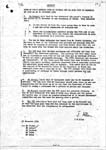 Monday 30 December 1974
Monday 30 December 1974
Document reference: PREM 16/515/4
(Page dated 31 December 1974; Marked Secret)
Note of a meeting between British government officials and Protestant clergymen.
This document is one page of a note, written by James M. Allan, then a Foreign Office diplomat, of a meeting between the Permanent Under-Secretary (PUS), on behalf of the British government, and Mr Stanley Worrall and Dr Jack Weir. The meeting took place at 10.00am on Monday 30 December 1974 at a house known as Laneside, in Hollywood, County Down. Worral and Weir had been part of a group of Protestant clergymen who had meet with senior members of the Irish Republican Army (IRA) at Feakle, County Clare, on 10 December 1974. While the meeting described in the note appears to be one involving intermediaries there were also direct contacts between IRA leaders and MI6 held at Laneside. Both Allan and Michael Oatley, then a member of the Secret Intelligence Service ('MI6'), were involved in these meetings with the IRA.
"The PUS [Permanent Under-Secretary] said that British ministers and officials had been busy throughout the Christmas holidays. The position was that while there was no negotiation with Provisional IRA we did not rule out an exchange of views. We did not want a propaganda campaign. ... If the truce held HMG could take some definite steps ...."
PREM 16/515/4 at CAIN web site - Pages: |
1 |
[Use your browser's back button to return to this page.]
PREM 16/515/4 at PRO web site [1 page] {external_link}
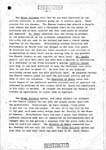 Wednesday 1 January 1975
Wednesday 1 January 1975
Document reference: PREM 15/515/3
(Page undated; Marked Restricted)
Note of a meeting between Harold Wilson and Church leaders from Northern Ireland.
This document is one page of a note of a meeting between Harold Wilson, then British Prime Minister, and the leaders of the main Churches in Northern Ireland (Cardinal Conway, Archbishop Dr GO Simms, Dr Temple Lundie, Rev Harold Sloan, Rev Donald Fraser). The background to this was the fact that representatives of the Irish Republican Army (IRA) had held secret talks with Protestant clergymen at a location in Feakle, County Clare, on Tuesday 10 December 1974. On Wednesday 18 December 1974 the Protestant clergymen met with Merlyn Rees, then Secretary of Sate for Northern Ireland, to report on their meeting with the IRA. These developments had led to an IRA ceasefire that began at midnight on Friday 22 December 1974 and was scheduled to end at midnight on
2 January 1975.
"The Prime Minister said that he had been impressed by the earlier reference to children going out to parties again. Peace created its own dynamic. The Church leaders had planted a fragile tree (which one might call a Christmas tree) in the desert of terrorism and we must consider how this tree could be watered."
PREM 15/515/3 at CAIN web site - Pages: |
1 |
[Use your browser's back button to return to this page.]
PREM 15/515/3 at PRO web site [1 page] {external_link}
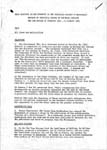 Thursday 9 January 1975
Thursday 9 January 1975
Document reference: PREM 16/515/2
(Page undated)
Summary of political events in Northern Ireland for the period 19 December 1974 - 9 January 1975.
"The Secretary of State for Northern Ireland, Mr Merlyn Rees, issued a statement following the announcement of the [IRA] ceasefire saying that he had seen the churchmen two days previously at their own request. He went on: 'The Government has received from the Churchmen what it understands to be the Provisional IRA´s proposals for a permanent ceasefire. ...' "
PREM 16/515/2 at CAIN web site - Pages: |
1 |
[Use your browser's back button to return to this page.]
PREM 16/515/2/3 at PRO web site [1 page] {external_link}
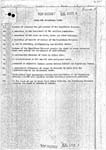 Thursday 17 January 1975
Thursday 17 January 1975
Document reference: PREM 16/521/2
(Page undated; Marked Top Secret and UK Eyes)
The document is one page in length and is entitled 'Terms for Bi-lateral Truce'. Although the PRO website dates this document to 1 October 1975 it appears to be much earlier and was probably drawn up some time between 17 January 1975 and 10 February 1975..
This document is one page long and contains a list of 12 items. The document appears to be a list of demands from the Republican movement that would have to be fulfilled by the British government in order to achieve a truce between the IRA and the security forces. The previous document (above) indicates that Merlyn Rees, then Secretary of State for Northern Ireland, had received some proposals from the Provisional IRA. It may be that the document ('Terms for Bi-lateral Truce') was passed to the British government between the ending of the ceasefire on 17 January 1975 and the beginning of the truce on 10 February 1975.
"9. Agreement on effective liaison system between British and Republican Forces.
10. A progressive withdrawal of troops to barracks to begin with the implementation of the bi-lateral truce.
11. Confirmation that discussions between representatives of the Republican Movement and HMG will continue towards securing a permanent ceasefire. "
PREM 16/521/2 at CAIN web site - Pages: |
1 |
[Use your browser's back button to return to this page.]
PREM 16/521/2 at PRO web site [1 page] {external_link}
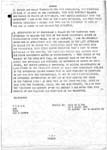 Monday 20 January 1975
Monday 20 January 1975
Document reference: PREM 16/515/1
(Page undated; Marked Secret)
Telegram containing note of a meeting between a British Embassy official and the Taoiseach.
This document is one page of a telegram containing a note of a meeting between Galsworth, of the British Embassy in Dublin, and Liam Cosgrave, then Taoiseach (Irish Prime Minister). The telegram was sent to Harding, Foreign and Commonwealth Office, and Cooper, Northern Ireland Office, on 20 January 1975. Galsworth met with Cosgrave to inform him of the on-going contacts between the British government and Provisional Sinn Féin.
"In general conversation he [The Taoiseach] laid stress on the traumatic effect it would have throughout Ireland if the impression gained ground that we [the British government] were prepared to negotiate in any way with the Provisionals, in any of their manifestations. He expressed appreciation of the way were keeping the Irish [government] in the picture ...."
PREM 16/515/1 at CAIN web site - Pages: |
1 |
[Use your browser's back button to return to this page.]
PREM 16/515/1 at PRO web site [1 page] {external_link}
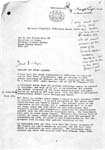 Monday 20 January 1975
Monday 20 January 1975
Document reference: PREM 16/490/1
(Page dated 20 January 1975; Marked Confidential)
Letter from the Chief Secretary to the Treasury to Merlyn Rees.
This document is one page of a letter from Joel Barnett, then Chief Secretary to the Treasury, to Merlyn Rees, then Secretary of State for Northern Ireland, dated 20 January 1974 about the Harland and Wolff shipyard in Belfast. The British government had taken the decision to bale out the company by including Harland in its plans for the nationalisation of shipbuilding.
"I am perturbed at the latest news about Harland and Wolff´s losses. The picture given in the submission is bad enough, but I understand that it is not the whole story and that there are new indications that Harland's present and prospective losses may be significantly greater ... The government has already put £80 million into this company since 1967, ...
"
PREM 16/490/1 at CAIN web site - Pages: |
1 |
[Use your browser's back button to return to this page.]
PREM 16/490/1 at PRO web site [1 page] {external_link}
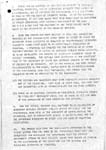 Thursday 20 February 1975
Thursday 20 February 1975
Document reference: PREM 16/517/3
(Page undated; Not marked)
One page from a telegram sent by Callaghan to the British Ambassador in Dublin.
This document is one page from a telegram sent by James Callaghan, then British Foreign Secretary, to the British Ambassador in Dublin. The telegram contains notes about matters related to Northern Ireland that Callaghan wanted the Ambassador to raise with Liam Cosgrave, then Taoiseach (Irish Prime Minister). The telegram mentions the proposal to establish seven 'incident centres' to deal with problems that arose during the IRA ceasefire.
"Discussion focused on the arrangements which would be needed to avoid the ceasefire being disrupted by isolated or spontaneously generated incidents which might lead to an uncontrolled escalation of violence. A proposal was evolved for the setting up of seven incident centres ...
"
PREM 16/517/3 at CAIN web site - Pages: |
1 |
[Use your browser's back button to return to this page.]
PREM 16/517/3 at PRO web site [1 page] {external_link}
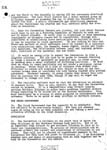 Friday 14 March 1975
Friday 14 March 1975
Document reference: CAB 134/3921/2
(Page undated; Marked Secret)
One page from a note by Merlyn Rees.
This document is one page from a note (Papers to IRN (75) 11) by Merlyn Rees, then Secretary of State for Northern Ireland, and the document is dated 14 March 1975. The note deals with plans for the Constitutional Convention; the election to which was held on 1 May 1975.
"The Convention is unlikely in the short term to solve the deep divisions in the Northern Ireland body politic. But it is an important step forward to get Northern Irishmen to face up to their own responsibilities.
"
CAB 134/3921/2 at CAIN web site - Pages: |
1 |
[Use your browser's back button to return to this page.]
CAB 134/3921/2 at PRO web site [1 page] {external_link}
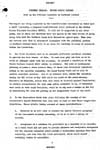 Monday 7 July 1975
Monday 7 July 1975
Document reference: CAB 134/3921/6
(Page undated; Marked Secret)
One page of a note by the Official Committee on Northern Ireland.
This document is one page from a note (Papers to IRN (75) 25) by the Official Committee on Northern Ireland dated 7 July 1975. The note is entitled 'Northern Ireland: Future Policy Options' and deals with the outcome of the Constitutional Convention. The note begins by stressing the need to avoid a clash between the British government and the Protestant population in the region.
"
We must also play our hand so as to avoid an outright clash with the majority. At present a repetition of the Ulster Workers Council (UWC) strike is unlikely. The note on contingency planning at Annex A shows however that, if there were determined industrial action by the majority community, the Armed Forces would not be able to sustain essential services: ... action this time would be directed against Westminster.
"
CAB 134/3921/6 at CAIN web site - Pages: |
1 |
[Use your browser's back button to return to this page.]
CAB 134/3921/6 at PRO web site [1 page] {external_link}
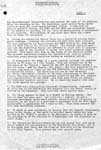 Friday 19 September 1975
Friday 19 September 1975
Document reference: CAB 134/3921/5
(Page undated; Marked Confidential)
One page of an annex to a note (Papers to IRN (75) 20) about the Constitutional Convention, 19 September 1975.
This document is one page from an annex to a note. It is described as part of Papers to IRN (75) 20; dated 19 September 1975. There was no indication at the PRO website as to the author of the note nor the person for whom it was written. The note discusses the Constitutional Convention and in particular proposals by William Craig, then a member of the United Ulster Unionist Council (UUUC), for a voluntary coalition with the Social Democratic and Labour Party (SDLP).
"
On 8 September the UUUC, at a party meeting rejected the proposed package by 37 votes to 1 (Mr. Craig). This was largely due to the influence of Mr. Paisley – backed by the UWC and probably making a bid for power – and Mr. Powell.
"
CAB 134/3921/5 at CAIN web site - Pages: |
1 |
[Use your browser's back button to return to this page.]
CAB 134/3921/5 at PRO web site [1 page] {external_link}
See also:
Public Records
New Year Releases 2003 - Public Records of 1972
New Year Releases 2004 - Public Records of 1973
New Year Releases 2005 - Public Records of 1974
New Year Releases 2006 - Public Records of 1975
| 









